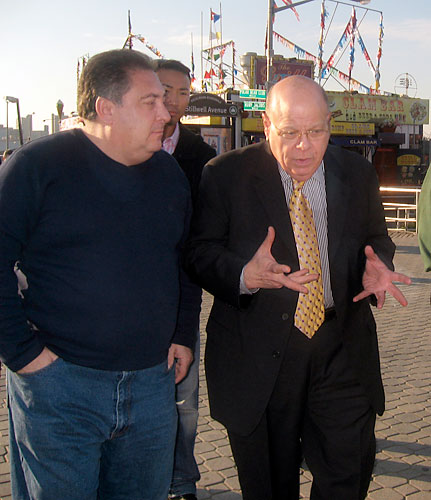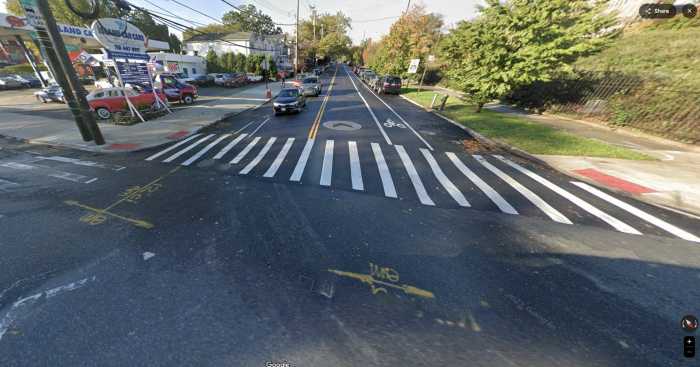State Sen. Carl Kruger was charged on Thursday with trading his political clout for personal gain — just one week after his attorney claimed the FBI was no longer investigating the Brooklyn legislator.
Kruger (D–Brighton Beach), the former chair of the powerful Senate Finance Committee; Assemblyman William Boyland Jr. (D–Brownsville); Richard Lipsky, a longtime small business lobbyist and blogger whose clientlist includes Forest City Ratner Companies, the United Food and Commercial Workers Union and the Neighborhood Retail Alliance; and five others were netted in a sweeping bribery and conspiracy investigation in which lobbyists sent payments to a shell company controlled by Kruger, who would in turn to grease the wheels for the lobbyist’s deep pocketed clients.
Federal prosecutors said that lobbyists paid Kruger close to $1 million to:
• Delay the expansion of a bill that included a five-cent deposit on bottled water. Lipsky allegedly paid Kruger to not add bottled water to the bill, but it was ultimately added and passed in 2009. Despite that, Kruger put in legislation to delay the imposition of the deposit law until January, 2010.
• Alter the Alcoholic Beverage Control Law so grocery stores could begin selling wine. Kruger also helped forward legislation that would expand hours for liquor stores. All of this was done at the behest of Lipsky, who represents supermarket and liquor store retailers, federal investigators allege.
• Fight Walmart. The indictment alleges that Lipsky, who had been hired by the Food and Commercial Workers Union, paid Kruger to speak out against Walmart and other big box stores planning on coming to Brooklyn.
• Go to war with Native Americans. Kruger’s 2009 push to force Indian reservations to collect states sales taxes on cigarettes sold there was bankrolled by Lipsky on behalf of a supermarket chain tired of being undercut by cheaper cigarettes sold on native lands.
Kruger faces more than 20 years in prison if convicted of the conspiracy charges, federal investigators said.
The eight-term legislator had been under investigation for swapping political favors for high priced fundraisers, but attorney Benjamin Brafman claimed last week that the federal investigation into Kruger died when Michael Levitis, the government’s key witness, admitted he had lied to authorities.
“We have maintained from the very start that Sen. Kruger did absolutely nothing wrong,” Brafman told us. “We are pleased that this case is now closed.”
Levitis pleaded guilty to lying to investigators on March 1 and will be sentenced to six months in jail in the coming weeks.
But the FBI never confirmed that it was done with Kruger and sources said its corruption probe into Kruger was continuing. Brafman shrugged off those claims.
“During my 35 years as a criminal defense lawyer, I don’t think I have ever heard a government prosecutor actually saying that an investigation was over,” Brafman told us. “More often than not, they say there is an ongoing investigation when in truth there is no further investigation because there is nothing to investigate.”
Calls to Brafman for comment on this latest development were not returned.
The federal case appears to boil down to this: Levitis, a lawyer who co-owns the Rasputin Supper Club on Coney Island Avenue and Avenue X, allegedly recommended to a restaurateur working with the FBI that he make a donation to Kruger’s campaign. In turn, Kruger would handle the eatery owner’s problems with the State Liquor Authority, Levitis alleged.
“To start off, you have to throw in a few thousand,” Levitis explained during a conversation recorded on April 14, 2009. “[It] depends on whether the problem is big or small. How much work he has to put in.”
The informant gave Levitis $3,000 — $2,000 for Kruger and $1,000 for Levitis’s help in brokering the deal. Levitis told the informant he gave Kruger’s money to Jason Koppel, the senator’s chief of staff, but it’s unclear if the donation was ever handed over.
On Sept. 18, Levitis contacted the undercover restaurateur again, claiming that his hearing with the State Liquor Authority was postponed for two weeks.
“So, for now, you can still work,” Levitis explained. “He [Kruger] asked that you do a fundraiser. I said, ‘Help first.’ But he does want you to do a fundraiser.”
Yet Levitis may have been blowing smoke: according to a state spokesman, no one from Kruger’s office had contacted the State Liquor Authority on Levitis’s or the federal informants’ behalf.
Kruger has stated in the past that Levitis dropped his name without the senator’s knowledge.
“I was nothing more than a pawn in this chess game,” Kruger said last year, following Levitis’s arrest.
According to campaign filings, Levitis had made more than $8,000 in contributions and fund raising services to Kruger’s campaign since 2006, but Kruger has maintained that those dollars don’t guarantee anything to the donor.
“I have thousands of contributors and, like every elected official around the country, I intercede in government matters and cut through the political red tape for my constituents,” he said. “But there’s no guaranteed quid pro quo.”
Levitis denied that the conversation with the informant took place, even though investigators had everything on tape.
With help from Levitis and many others, Kruger has $1.8 million to spend on his next re-election campaign.
During his last election — four months after the alleged “pay-to-play” scam was reported — Kruger trounced Conservative opponent Avrahom Rosenberg, garnering 73 percent of the vote.






















